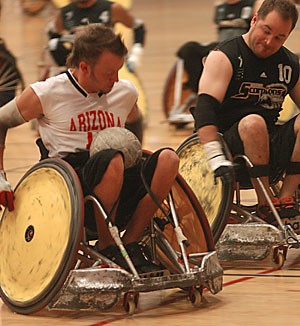Kurt Lawton is not the typical Arizona athlete. A native of Georgia, the freshman speaks with a pronounced Southern drawl that earned him the nickname “”Country.”” He also has cerebral palsy.
As a member of Arizona’s wheelchair rugby team, he embraces both.
“”I don’t mind (the nickname) at all,”” he said. “”I actually respond to it better than I do my own name.””
As Lawton took the court with his fellow ruggers at last weekend’s UA Rugby Rage Tournament, “”Bear Down”” blasted over the Student Recreation Center speakers. A small but enthusiastic crowd of about 20 family members and friends cheered on their Wildchair Ruggers, whose Red and Blue squads took third and sixth place, respectively.
Two minutes into the second half of a game against the Utah Scorpions, Lawton took a vicious hit that sent his chair onto its back. In a matter of seconds, Lawton was upright and back in the game.
“”Thank God I’m a Country Boy”” played over the speakers. Someone in the crowd shouted “”Yee ha!””
“”It is hard (to get a good nickname),”” Lawton said. “”But it stuck and it stayed.””
Originally known as “”murder ball”” for the sport’s aggressive nature, wheelchair rugby is a fast-paced, five-on-five game played on a basketball court. Each team’s goal essentially is to carry the ball past the 8-meter goal line at the end of the court.
The players have 10 seconds to advance the ball past the half-court line into enemy territory. A player in possession of the ball has 10 seconds to pass, dribble the ball once or score. Failing to do so results in a turnover.
The game is defined by the constant thunderclap of battle-damaged wheelchairs slamming into each other as each team does what is necessary to push through to the goal line or hinder the progress of the offense. The sound is jarring, and the crowd reacts to particularly brutal hits with cheers. The players’ scarred chairs reveal game-after-game punishment.
Lawton identifies the rough-and-tumble nature of the sport as one of his primary motivations for taking up wheelchair rugby.
“”I wasn’t any good at wheelchair basketball,”” he said, “”and I liked the fact that you got to absolutely crush people.””
Pima Community College student Chad Cohn, one of the team’s players , relishes this aspect of the game.
“”I just love being out there with the guys running into each other,”” Cohn said. “”You definitely get to take out a little aggression.””
Cohn, a Tucson native, didn’t make a cross-country voyage for Arizona rugby like Lawton, who specifically chose the UA for its rugby team. For Cohn, who was partially paralyzed from a car accident, Arizona rugby entered his life after his sister introduced him to assistant coach Gabe Nyrkannen, who she was taking classes with.
“”I was kind of hesitant at first,”” Cohn said. “”But I jumped in a chair and now I love it. …I eat and sleep rugby.””
Rugby Rage 2006, hosted by the UA wheelchair rugby team, is the first such tournament to be held at the UA in four years. The tournament is the brainchild of newly appointed head coach Bryan Barten, who also plays on the team. His goal is to hold a tournament at Arizona every year.
“”We have a really nice facility here at the Rec Center,”” he said. “”The weather is nice here. We can host it on campus. It’s just a great place to host a tournament.””
As both a coach and player, Barten demonstrates the same kind of zeal and passion for the sport found in Lawton and Cohn. With Barten tearing apart the opposition with pin-point passing in a 44-27 blowout against Utah, the Scorpion bench shouted, “”Two players on No. 34!”” (Barten wears No. 34.)
Before the car accident that left him partially paralyzed, Barten was an avid athlete, playing basketball, football and track and participating in mountain biking and snowmobiling.
Since his accident, Barten has persevered in sports – in fact, he admits it might have pushed him to pursue them further.
“”If I hadn’t been hurt or started using a wheelchair, I probably wouldn’t be playing sports like I do now,”” he said. “”This is what I do now, coach and play.””
Cohn sees himself and teammates like Lawton and Barten as standing in direct contradiction to stereotypes of disabilities. For Cohn, events like Rugby Rage and even the existence of the team itself are just another step toward dispelling negative perceptions.
“”You see individuals in wheelchairs, and the stereotype is that they must be angry and bitter and maybe not even all there,”” he said. “”But we’re just like everybody else. We just want to come out here and play, have some fun.””









